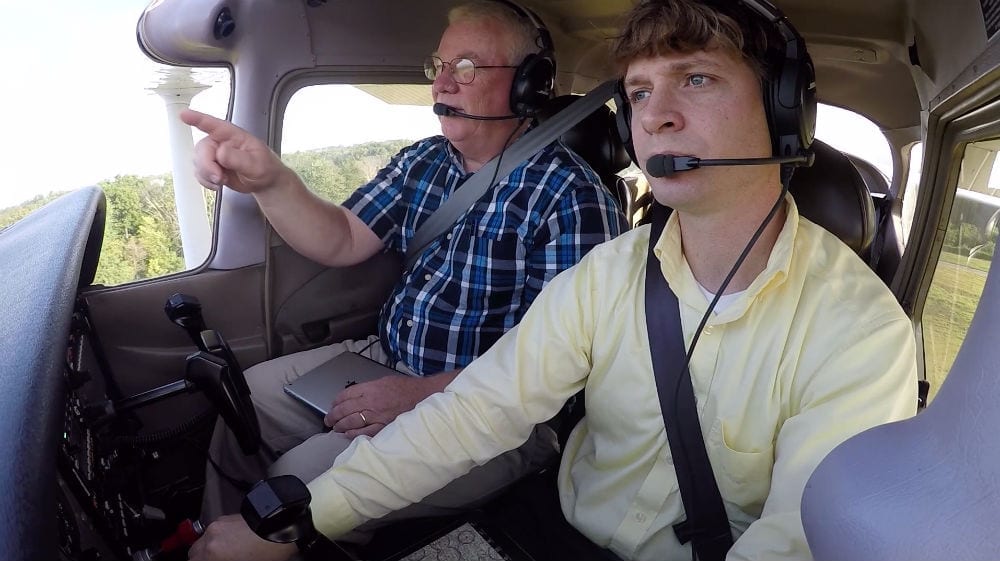
Basic math for pilots: does it still matter?
OpinionMost of the new-hires came completely unglued when forced to execute visual approaches – especially when cleared for such approaches while still quite high and many miles from the field. He said his flights were often forced to miss the first attempts at visual approaches and go around because of the airplanes being much too high on their profiles; I wondered to myself how such a systemic problem could exist in this computerized age.

My Bonanza is a time and dimension machine
OpinionBonanza N3255V, born in 1947, is the machine that allows us to enter a world that I still struggle to get my head around. It is a world of possible extreme juxtapositions. We climb into the aluminum tube, go up into the air, and whisk across the planet to land anywhere we choose and instantly enter a different world – not forgetting the experience along the way.

What I learned about instructors during private pilot training
OpinionThe greatest weakness a student pilot has is that they lack the pilot skills to judge the quality of the super pilot assigned to be their instructor. Before first solo, the new student has all instructors on a throne. The CFI is god-like, certified by the government and endowed with such superior skills that they can “teach ME to fly.”

Where is the upwind leg?
OpinionI had taken off from a small airport in southern Arizona, when the tower asked me to extend my upwind leg. “I’ll extend departure leg,” I acknowledged. I just happened to be flying with my CFI, who is also a controller at the same airport. My CFI gave me a quizzical look. I asked, “why do controllers use incorrect terminology to describe the departure leg?”

An ode to flying – and why it’s different from piloting
OpinionSo what is flying? Clearly it is riding inside a machine in the sky. The machine can be very simple or extremely complex -- but each one is a ride into the sky. From takeoff to landing, the pilot is flying in the sky by controlling a machine which will return to earth.

The enlightenment: how flying has made it all my hometown
OpinionI realized flying has made it all my hometown. My neighborhood now stretches from sea to shining sea; I am a part of all of it. I thought of a trip from Chicago to Texas where a storm system left me options through Kansas or through Georgia. Either one would work. As easy as picking a bank branch on one of two corners, my choice for convenience now can cross a thousand miles.

Risk management: it’s a personal thing
OpinionWhat are you willing to risk? It's a question at the heart of everything we do as pilots. Obviously, we're willing to take a few risks or we wouldn't be flying at all. Fact is that flying is a gazillion times safer than many other activities. It's also a fact that it can be terribly unforgiving of errors or carelessness compared to other hobbies.

What all pilots can learn from glider flying
OpinionI don't mean to suggest the absence of a few self-inflicted off-airport sailplane landings precludes a person from being a fundamentally skilled, aware, and eminently safe power pilot, of course. Far from it. It's just that even the relatively simple act of “collecting a glider rating” can easily have beneficial blow-back; learning how to soar without ever leaving the vicinity of your training airport even more; planting a foot in both the power and soaring worlds still more.

Sully and the impossible turn
OpinionLet’s cut right to the chase – Sully is a movie that any pilot, and especially an airline pilot, can watch without being mortified by technical and artistic errors on the part of the filmmakers. The portions of the movie that depict the flight and the water landing are done to near perfection. Tom Hanks and Aaron Eckhart not only play the role of airline pilots superbly, but they even manage to look a good deal like the originals.

Confessions of a timid pilot
OpinionWould it be VFR by the time I got there? Maybe… maybe not. Sure I’m instrument current, but is that good enough? Maybe… maybe not. It’s legal, but legal isn’t always smart. So, with full tanks I taxied back to the hangar and, after some light ribbing from my flip-flop-wearing buddy who questioned my judgment on such a perfect day, we heaved her back into the hangar.

Aviation’s next generation – be the spark
OpinionLook around for that airport kid in your neighborhood or at the local airport and make his or her day by offering them some time exploring your plane or taking a short hop. It won’t cost you anything but some time and kindness and most of their parents would be thrilled to let them have the experience.

Are car autopilots the equivalent of airplane autopilots?
OpinionA fairly basic autopilot with an altitude hold function allows a pilot to focus elsewhere safely for long stretches, especially if en route under IFR rules, with ATC providing traffic separation. Even so, that isn’t an invitation to watch a Harry Potter movie, as the Tesla driver is alleged to have been doing.

What are aerobatics, and when do I need a parachute?
OpinionA recent magazine article on the subject of aerobatic flight got me to thinking about what the regulations actually say. While looking for information, I ran across a recent (2012) legal opinion from an FAA counsel that left me more confused than enlightened.

5 things every VFR pilot should say
OpinionRadio communication is always one of the hardest things to learn for many pilots. It actually seems to make flying harder sometimes: you’re already busy flying the airplane when ATC gives you a call so fast all you catch is your tail number. Other pilots in CTAF areas can make it even worse. Let me give you the top five things I’ve learned to say over the years that have made flying easier and safer.

Certifying pilots: the new Airman Certification Standards
OpinionThe FAA is gearing up to start replacing the Practical Test Standards – the FAA’s checkride guidance for applicants, instructors, and designated pilot examiners (DPEs). The PTS has been the “Cliff Notes-to-the-Checkride” for years. Why in the world would the FAA mess with a good thing?

Why CFIs need to think about confidence more
OpinionWho would feel safe flying with someone who did not have an appropriate level of confidence? In my mind, developing a student’s self-confidence should be one of the main jobs of the instructor. During periods where pilots are not actively undergoing flight training, it needs to be something they work on themselves. I can think back to several experiences which taught me this firsthand.

Facebook is bad for general aviation
OpinionHow can we turn around the public’s fear and confusion about GA? Let’s all agree, and get other pilots we know, to take the three-item Facebook pilot pledge. The three items are simple: Don’t share bad news, share only good news and share the beauty we see.

The case for automation
OpinionLately there has been a lot of focus on over-reliance on automation in the cockpit – both in general aviation and the Part 121 world. Most of us can agree that as our avionics and aircraft become more sophisticated and automation becomes more affordable, this is a very real problem. But what about those of us who insist on flying with too little automation?

Old men and old airplanes
OpinionAre old guys attracted to old airplanes by nostalgia? For sure, in the first 30 years or so after WWII, there were lots of pilots whose romance with aviation began in the excitement of Lindbergh’s Atlantic crossing, grew through the “Golden Age” of ‘30s air racing and record-setting, and perhaps matured as biplanes went to war.

The real incentives young aviators need
OpinionAviation is not just about playing with your family’s toys and living out the thrills of flying every day. It’s about the friendships that are created in hangars, the sound of a Lycoming roaring to life after YOU replaced that cylinder, the old school feeling of grass under your landing gear, the controlling of numerous aircraft simultaneously, and the everlasting wonder of flight.
